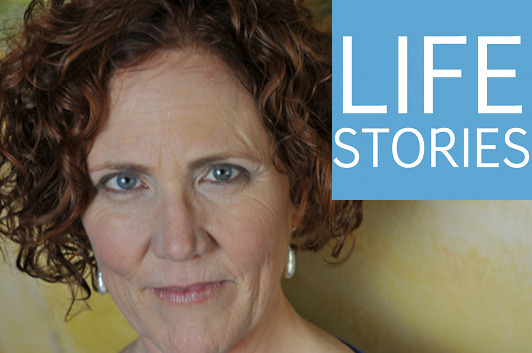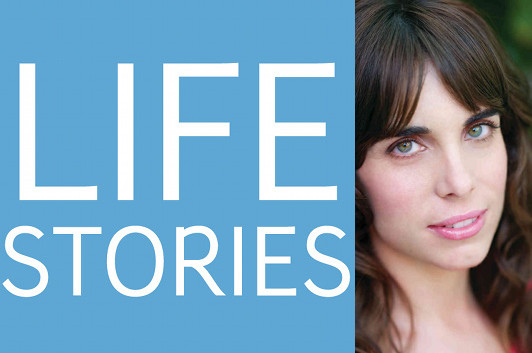Life Stories #29: Mary Johnson
In this episode of Life Stories, the podcast series where I interview memoir writers about their lives and the art of writing memoir, I meet Mary Johnson, who spent nearly two decades in Mother Teresa’s Missionary of Charity, which she writes about in An Unquenchable Thirst. We talk about the urge to help the poor that drew her to a nun’s life, and whether or not the Missionary gave her the best opportunity to do that; we also discuss the warnings young Mary received against forming “particular friendships” with her fellow sisters, and how those instructions sailed right over her head, leaving her open to be seduced by a manipulative nun later in her career. (I ended up referring to her time with the Missionary as a “career” because I couldn’t think of a better word to describe it…) And we talk about why she decided to leave the order, and what she’s been up to in the years since, including her work as the director of the A Room of Her Own Foundation.
I observed that Johnson had left the order shortly after Christopher Hitchens had published his critique of Mother Teresa and her works, The Missionary Position, and that while she made many of the same points about Mother’s limitations as a social reformer, she also brought a more personal perspective to the subject. She agreed:
“He was right that Mother Teresa took money from anybody—from the Duvaliers, from Castro… She took money from Charles Keating and refused to give to back to the people whom he had cheated to get that large, substantial sum that he donated. Christopher Hitchens had all those facts right, but I don’t think he really understood Mother Teresa’s motivations. He called her a hypocrite, and I don’t think she was. I think she really firmly believed in what she was doing, she was trying her best. She did have limited understanding. She was born in 1910 in Albania; there were a lot of things that she really didn’t grasp. But I never found anything in her that was hypocritical.
“And what was interesting to me about Hitchens was that in 2007—so, ten years after Mother Teresa’s death—he read the letters that she had written to her spiritual directors very early on, letters in which she talks about her doubts, about her soul feeling tormented. Hitchens publicly revised his opinion about Mother Teresa, in that he took back the hypocrite word and said, basically, he thought she was a true believer and she was trying her best and she was… manipulated by the Vatican, was the way he worded it, and I think that was very accurate.”
Listen to Life Stories #29: Mary Johnson (MP3 file); or download the file by right-clicking (Mac users, option-click).
30 March 2013 | life stories |
Life Stories #28: Domenica Ruta
In this episode of Life Stories, the podcast series where I interview memoir writers about their lives and the art of writing memoir, I talk with Domenica Ruta about With or Without You, in which she describes being raised by a single mom who gave her her first OxyContin pill when she was ten years old, and the full blossoming of her alcoholism in her twenties. We talk about recovery, and the differences between writing drunk and writing sober, and how she found out what her mom—with whom she hasn’t spoken in seven years—thinks of the memoir through the New York Times.
During the conversation, I also made a reference to “the James Frey thing,” which is to say writing a memoir about addiction and recovery in the wake of the A Million Little Pieces controversy, and how enough time has passed that this maybe isn’t as much of an issue as it was in 2006 and immediately after. Ruta had a wonderful response:
“I think for better or for worse, and I think it’s a little of both, he has opened a door for memoirists to really explore what it means to have memory and to retell a story and to do that with craft. Part of the experience of recovery is trying to parse out what of my life is valid, what is invalid? What of my life is an emotional projection, what is real?
“I actually owe a debt, a great debt to James Frey for starting that conversation, as painful as it probably was for him—and I can only imagine—he started a really interesting conversation that I at least was engaged in in my head while I was writing this, which is, you know, when I get to points that I don’t remember clearly, how about I just dive head first into that uncertainty? How about I highlight the gaps in my memory? … I point out the moments when craft is taking over, when I paint something a certain color in the writing of the memoir, because I don’t exactly remember what color it was, but this is the color it needs to be in this truth. I don’t know how he wrote, how people wrote memoirs before that door was opened, so I’m really grateful for that.
Listen to Life Stories #28:: Domenica Ruta (MP3 file); or download the file by right-clicking (Mac users, option-click).
24 March 2013 | life stories |



 Our Endless and Proper Work is my new book with Belt Publishing about starting (and sticking to) a productive writing practice.
Our Endless and Proper Work is my new book with Belt Publishing about starting (and sticking to) a productive writing practice. 
